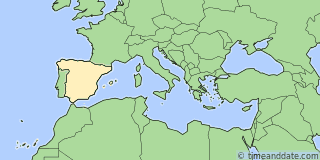| Current Time: | Jun 26, 2025 at 10:49:25 am |
|---|---|
| Moon Direction: | 87.58° E↑ |
| Moon Altitude: | 38.83° |
| Moon Distance: | 230,079 mi |
| Next Full Moon: | Jul 10, 2025, 10:36 pm |
| Next New Moon: | Jul 24, 2025, 9:11 pm |
| Next Moonset: | Today, 10:56 pm |

Moonrise, Moonset, and Phase Calendar for Vilers, June 2025
Scroll right to see more
| 2025 | Moonrise/Moonset | Meridian Passing | ||||||||||
|---|---|---|---|---|---|---|---|---|---|---|---|---|
| Jun | Moonrise | Moonset | Moonrise | Time | Distance (mi) | Illumination | ||||||
| 1 | - | 1:36 am | ↑ (296°) | 11:39 am | ↑ (67°) | 6:57 pm | (63.2°) | 241,093 | 35.7% | |||
| 2 | - | 2:02 am | ↑ (289°) | 12:48 pm | ↑ (74°) | 7:42 pm | (57.5°) | 244,565 | 46.0% | |||
| - | 2:23 am | ↑ (281°) | 1:52 pm | ↑ (82°) | 8:23 pm | (51.6°) | 247,470 | 56.1% | ||||
| 4 | - | 2:42 am | ↑ (273°) | 2:54 pm | ↑ (91°) | 9:02 pm | (45.6°) | 249,682 | 65.8% | |||
| 5 | - | 3:00 am | ↑ (266°) | 3:56 pm | ↑ (98°) | 9:42 pm | (39.8°) | 251,153 | 74.7% | |||
| 6 | - | 3:18 am | ↑ (258°) | 4:57 pm | ↑ (106°) | 10:22 pm | (34.3°) | 251,889 | 82.6% | |||
| 7 | - | 3:38 am | ↑ (251°) | 6:00 pm | ↑ (113°) | 11:04 pm | (29.3°) | 251,945 | 89.3% | |||
| 8 | - | 4:01 am | ↑ (244°) | 7:04 pm | ↑ (120°) | 11:49 pm | (25.0°) | 251,404 | 94.5% | |||
| 9 | - | 4:28 am | ↑ (238°) | 8:08 pm | ↑ (125°) | Moon does not pass the meridian on this day. | ||||||
| 10 | - | 5:01 am | ↑ (234°) | 9:11 pm | ↑ (128°) | 12:37 am | (21.7°) | 250,366 | 98.0% | |||
| - | 5:43 am | ↑ (231°) | 10:10 pm | ↑ (130°) | 1:28 am | (19.5°) | 248,934 | 99.7% | ||||
| 12 | - | 6:34 am | ↑ (230°) | 11:01 pm | ↑ (129°) | 2:22 am | (18.8°) | 247,197 | 99.3% | |||
| 13 | - | 7:34 am | ↑ (232°) | 11:44 pm | ↑ (126°) | 3:16 am | (19.6°) | 245,229 | 96.9% | |||
| 14 | - | 8:41 am | ↑ (236°) | - | 4:10 am | (22.0°) | 243,081 | 92.3% | ||||
| 15 | 12:19 am | ↑ (121°) | 9:51 am | ↑ (242°) | - | 5:01 am | (25.7°) | 240,788 | 85.8% | |||
| 16 | 12:48 am | ↑ (114°) | 11:02 am | ↑ (249°) | - | 5:50 am | (30.7°) | 238,380 | 77.4% | |||
| 17 | 1:12 am | ↑ (106°) | 12:14 pm | ↑ (257°) | - | 6:38 am | (36.6°) | 235,891 | 67.5% | |||
| 1:35 am | ↑ (98°) | 1:25 pm | ↑ (266°) | - | 7:24 am | (43.1°) | 233,389 | 56.6% | ||||
| 19 | 1:56 am | ↑ (89°) | 2:37 pm | ↑ (276°) | - | 8:10 am | (50.0°) | 230,975 | 45.0% | |||
| 20 | 2:18 am | ↑ (80°) | 3:52 pm | ↑ (285°) | - | 8:58 am | (56.9°) | 228,805 | 33.5% | |||
| 21 | 2:43 am | ↑ (71°) | 5:11 pm | ↑ (294°) | - | 9:49 am | (63.4°) | 227,061 | 22.6% | |||
| 22 | 3:13 am | ↑ (63°) | 6:32 pm | ↑ (301°) | - | 10:45 am | (69.1°) | 225,959 | 13.2% | |||
| 23 | 3:50 am | ↑ (56°) | 7:52 pm | ↑ (307°) | - | 11:45 am | (73.4°) | 225,689 | 6.0% | |||
| 24 | 4:38 am | ↑ (52°) | 9:06 pm | ↑ (310°) | - | 12:50 pm | (75.8°) | 226,371 | 1.6% | |||
| 5:38 am | ↑ (50°) | 10:08 pm | ↑ (309°) | - | 1:55 pm | (76.0°) | 228,026 | 0.2% | ||||
| 26 | 6:49 am | ↑ (52°) | 10:56 pm | ↑ (305°) | - | 2:57 pm | (74.1°) | 230,548 | 1.8% | |||
AltitudeHeadingPosition | ||||||||||||
| 27 | 8:04 am | ↑ (57°) | 11:33 pm | ↑ (299°) | - | 3:55 pm | (70.4°) | 233,723 | 6.1% | |||
| 28 | 9:19 am | ↑ (64°) | - | - | 4:47 pm | (65.5°) | 237,250 | 12.6% | ||||
| 29 | - | 12:02 am | ↑ (292°) | 10:31 am | ↑ (71°) | 5:35 pm | (59.8°) | 240,839 | 20.7% | |||
| 30 | - | 12:25 am | ↑ (284°) | 11:38 am | ↑ (79°) | 6:18 pm | (53.8°) | 244,190 | 29.8% | |||
| * All times are local time for Vilers. Time is adjusted for DST when applicable. They take into account refraction. Dates are based on the Gregorian calendar. Illumination is calculated at lunar noon. | ||||||||||||
Jan | Feb | Mar | Apr | May | Jun | Jul | Aug | Sep | Oct | Nov | Dec
Elsewhere on timeanddate.com

Earth to Spin Unusually Quickly in July and August
Since 2020, Earth has notched up unprecedentedly short days midway through the year. It will happen again in 2025.

Skywatching Tips for July 2025
What’s up in the day and night sky in July 2025, including the Moon occulting the Pleiades, and Sirius—the Dog Star—rising. Plus, Earth is at its farthest from the Sun.

Moon Guide for July 2025
July’s Moon phases, plus the Moon does the rounds and snuggles up to Saturn, Venus, Jupiter, and Mars throughout the month.

Full Moon Names
Ancient cultures gave names to the Full Moon. These names are still in use today.